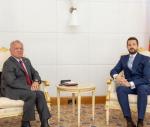You are here
After EU deal, factories struggling to hire Syrian workers — JCI
By Laila Azzeh - Aug 20,2016 - Last updated at Aug 20,2016
AMMAN – Recruiting Syrians is a prerequisite for companies that seek to benefit from eased access to European markets, but industrialists say they are struggling to hire Syrians, an industry representative said on Saturday.
Under the recently signed agreement with the EU to relax the rules of origin for Jordanian exports to Europe, at least 15 per cent of the manpower in the exporting factories must by Syrian, and the percentage should rise to 25 per cent after three years.
"The issue we face now is that Syrians prefer to work in the informal market and resent the obligations that come with the formal sector," Maher Mahrouq, director general of the Jordan Chamber of Industry (JCI), told The Jordan Times.
Syrians prefer informal jobs for several reasons, but primarily because they fear losing the financial assistance they receive from the UN, he explained.
"They also fear losing the flexibility the informal market gives them, which allows them to work multiple jobs and frees them from legal obligations when they are allowed to emigrate to Europe," said Mahrouq.
He added that Syrians find jobs easily in the informal market without the need to commit to working in factories in remote locations.
The JCI will soon launch campaigns with the International Labour Organisation (ILO) to raise Syrians' awareness about the importance of working in the formal market.
"They should know that the UNHCR said that it would not cut assistance to working Syrians," Mahrouq indicated, adding that the campaigns will also focus on the importance of being employed in the formal sector in terms of receiving social security and working in decent environments.
"I believe that this awareness will help change Syrians' attitudes towards formal jobs," he noted.
The EU deal entered into effect on July 20 and will be in place until the end of 2026.
Simplified rules of origin will be applied to exports of Jordanian origin that are manufactured in designated development zones and industrial estates in Jordan, including 50 harmonised system non-agricultural chapters.
A total of 24,000 work permits have been issued to Syrian refugees in Jordan so far, according to official figures.
Related Articles
AMMAN — Jordanian manufacturers are keen to export to Africa and want the authorities to help them access the market, which they say can mak
AMMAN — The grace period granted to Syrian workers to obtain permits has been extended until April in a bid to encourage more employers to r
AMMAN — The Jordan Chamber of Industry (JCI) has recently organised a “Diplomats for Exporters” forum in The Hague, The Netherlands.The thre

















